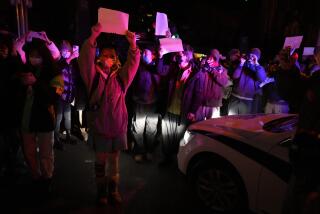TURMOIL IN CHINA: Crackdown on Dissent : Mitchell, Others Criticize Bush for Not Leading China Condemnations
- Share via
WASHINGTON — Senate Majority Leader George J. Mitchell (D-Me.) and others in Congress on Thursday strongly criticized President Bush for failing to forcefully condemn the execution of protesters in China.
Mitchell said he is upset by what he called Bush’s “refusal” to express the revulsion the American people feel about recent events in China. He suggested that Bush is being a follower on the issue, allowing other world leaders to speak out.
“The United States, as the leader of the world’s democracies, as the symbol of freedom throughout the world, should be leading, not following, in this instance,” Mitchell said.
“I urge the President to assume the proper role as spokesman for the American people, as leader of the Free World, and condemn these actions in the strongest possible terms and to convey directly to the Chinese leadership the disastrous consequences of the course which they are now pursuing.”
But the congressional criticism had no immediate impact on the President. In his first comment on the subject in two weeks, Bush told reporters: “China--we’re all very concerned about that.”
White House Press Secretary Marlin Fitzwater said the President sees no need to say anything more at this time.
“We don’t believe there’s anyone in the world who doubts where the United States stands,” he said. “We feel the Administration has spoken out loudly, strongly, without reservation on this issue--forcefully, more than any other country in the world. . . . There’s no need to repeat different words every day of the week.”
Likewise, Secretary of State James A. Baker III told the House Foreign Affairs Committee that no additional actions against China are planned because U.S. policy toward Beijing must include matters beyond Chinese violations of human rights.
“Human rights has got to be a fundamental keystone and basis for American foreign policy, but there are also other considerations in the formation and implementation of American foreign policy that must be taken into account,” Baker said. “And the geopolitical (and) economic relationship between the People’s Republic of China and the United States is important.
“Many people, both in the People’s Republic of China and the United States, have worked for many years, 10 to 12, 15 years, to improve what had been a very poor relationship between these two countries, and significant progress had been made.”
Nevertheless, it appeared that congressional pressure on Bush to speak out more forcefully is only going to grow stronger in the days ahead. House Majority Leader Richard A. Gephardt (D-Mo.) announced that the House leadership is drafting bipartisan legislation that would impose additional economic sanctions on China if the repression in that country continues.
Among other things, House members have proposed revoking most-favored-nation trading status for China and suspending subsidized loans to Chinese enterprises through the Overseas Private Investment Corp.
“Our government has taken a few limited, cautious, timid steps,” said California Rep. Tom Lantos (D-San Mateo) during a human rights task force hearing that he co-chaired with Rep. John Edward Porter (R-Ill.) “Rep. Porter and I feel we have to go beyond this.”
Lantos conceded that such sanctions might hurt the people of China as well as the government, but he added: “This Administration was not reluctant to impose economic sanctions on Nicaragua. . . . We should be willing to take similar actions against the People’s Republic of China.”
For his part, Mitchell made no mention of additional sanctions. But he called on Bush “to condemn these actions personally and in the strongest possible terms, to give voice to the feelings of the overwhelming majority of the American people who are outraged and revolted by these executions.”
Gephardt said that members of Congress were disturbed when they met earlier this week with the Chinese ambassador to the United States, Han Xu, who indicated that he believes U.S. criticism of his country is coming primarily from Democrats and not from Republicans.
In an effort to demonstrate the bipartisan nature of the U.S. position, the House passed a resolution 416 to 0 Thursday expressing support for the President’s call for clemency for the Chinese demonstrators.
Times staff writers Josh Getlin and David Lauter also contributed to this article.
More to Read
Get the L.A. Times Politics newsletter
Deeply reported insights into legislation, politics and policy from Sacramento, Washington and beyond. In your inbox twice per week.
You may occasionally receive promotional content from the Los Angeles Times.








